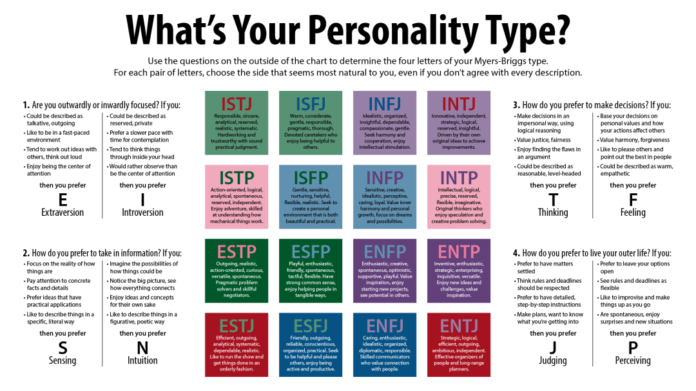Excerpt:
The Myers-Briggs uses false, limited binaries
With most traits, humans fall on different points along a spectrum. If you ask people whether they prefer to think or feel, or whether they prefer to judge or perceive, the majority will tell you a little of both. Jung himself admitted as much, noting that the binaries were useful ways of thinking about people, but writing that “there is no such thing as a pure extrovert or a pure introvert. Such a man would be in the lunatic asylum.”
But the test is built entirely around the basis that people are all one or the other. It arrives at the conclusion by giving people questions such as ”You tend to sympathize with other people” and offering them only two blunt answers: “yes” or “no.”
“There is no such thing as a pure extravert or introvert,” Jung wrote
It’d be one thing if there were good empirical reasons for these strange binary choices that don’t seem to describe the reality we know. But they come from the disregarded theories of an early-20th-century thinker who believed in things like ESP and the collective unconscious.
Actual data tells psychologists that these traits do not have a bimodal distribution. Tracking a group of people’s interactions with others, for instance, shows that as Jung noted, there aren’t really pure extroverts and introverts, but mostly people who fall somewhere in between.
Theoretically, people might still get value out of the Myers-Briggs if it accurately indicated which end of a spectrum they were closest to for any given category.
But the problem with that idea is the fact that the test is notoriously inconsistent. Research has found that as many as 50 percent of people arrive at a different result the second time they take a test, even if it’s just five weeks later.
As many as 50 percent of people arrive at a different result the second time they take the test
That’s because the traits it aims to measure aren’t the ones that are consistently different among people. Most of us vary in these traits over time — depending on our mood when we take the test, for instance, we may or may not think that we sympathize with people. But the test simply tells us whether we’re “thinking” or “feeling” based on how we answered a handful of binary questions, with no room in between.
Relevance:
I found this article truly intriguing as someone who constantly asks people about their MBTI type in daily life. Not too long ago, I asked a friend about his MBTI, and he questioned whether the MBTI method is accurate. This made me reflect on how my own test results always differ each time I take it. The article discusses how the Myers-Briggs Type Indicator is largely unscientific and unreliable, arguing that it oversimplifies complex human personalities into binary categories, which can be misleading. It also states that people are never purely introverted or extroverted; there’s no such thing as being completely one or the other. I agree with this but was hesitant to express it; people often label me as an extrovert, but deep down, I feel more like an introvert and have been faking extroversion for social purposes. I wonder how many others feel the same way. I was an introvert several years ago, but because I’ve been faking being an extrovert, no matter how I take the test now, it shows that I am definitely an extrovert, and no one thinks I am an introvert in my daily life. So, I am also wondering if faking extroversion or introversion can impact and shape a person’s real personality.
Reference:
McKenna, B. (2014, July 15). The Myers-Briggs personality test is pretty much meaningless. Vox. https://www.vox.com/2014/7/15/5881947/myers-briggs-personality-test-meaningless




